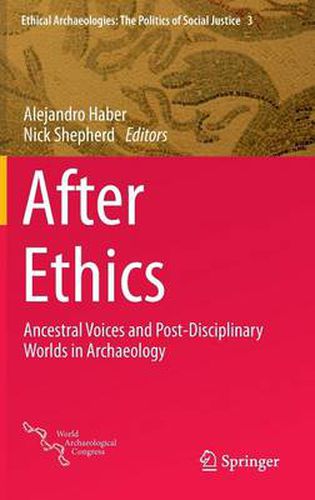Readings Newsletter
Become a Readings Member to make your shopping experience even easier.
Sign in or sign up for free!
You’re not far away from qualifying for FREE standard shipping within Australia
You’ve qualified for FREE standard shipping within Australia
The cart is loading…






This title is printed to order. This book may have been self-published. If so, we cannot guarantee the quality of the content. In the main most books will have gone through the editing process however some may not. We therefore suggest that you be aware of this before ordering this book. If in doubt check either the author or publisher’s details as we are unable to accept any returns unless they are faulty. Please contact us if you have any questions.
While books on archaeological and anthropological ethics have proliferated in recent years, few attempt to move beyond a conventional discourse on ethics to consider how a discussion of the social and political implications of archaeological practice might be conceptualized differently. The conceptual ideas about ethics posited in this volume make it of interest to readers outside of the discipline; in fact, to anyone interested in contemporary debates around the possibilities and limitations of a discourse on ethics. The authors in this volume set out to do three things. The first is to track the historical development of a discussion around ethics, in tandem with the development and disciplining of archaeology. The second is to examine the meanings, consequences and efficacies of a discourse on ethics in contemporary worlds of practice in archaeology. The third is to push beyond the language of ethics to consider other ways of framing a set of concerns around rights, accountabilities and meanings in relation to practitioners, descendent and affected communities, sites, material cultures, the ancestors and so on.
$9.00 standard shipping within Australia
FREE standard shipping within Australia for orders over $100.00
Express & International shipping calculated at checkout
This title is printed to order. This book may have been self-published. If so, we cannot guarantee the quality of the content. In the main most books will have gone through the editing process however some may not. We therefore suggest that you be aware of this before ordering this book. If in doubt check either the author or publisher’s details as we are unable to accept any returns unless they are faulty. Please contact us if you have any questions.
While books on archaeological and anthropological ethics have proliferated in recent years, few attempt to move beyond a conventional discourse on ethics to consider how a discussion of the social and political implications of archaeological practice might be conceptualized differently. The conceptual ideas about ethics posited in this volume make it of interest to readers outside of the discipline; in fact, to anyone interested in contemporary debates around the possibilities and limitations of a discourse on ethics. The authors in this volume set out to do three things. The first is to track the historical development of a discussion around ethics, in tandem with the development and disciplining of archaeology. The second is to examine the meanings, consequences and efficacies of a discourse on ethics in contemporary worlds of practice in archaeology. The third is to push beyond the language of ethics to consider other ways of framing a set of concerns around rights, accountabilities and meanings in relation to practitioners, descendent and affected communities, sites, material cultures, the ancestors and so on.